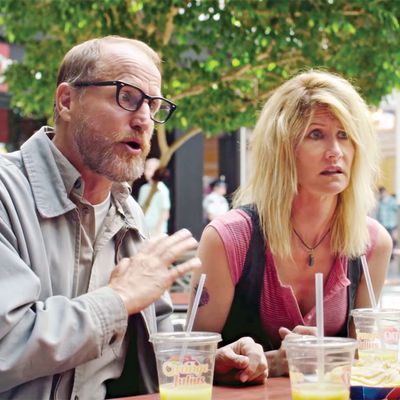
The brusque, foulmouthed character study Wilson is a likable attempt to transform a story that works beautifully in one medium (comics) into something more dramatic and expansive. The transformer (i.e., screenwriter) is the comic’s creator, Daniel Clowes, whose protagonists (he wrote Ghost World) often fancy they have more integrity than the rest of the world. Fortunately, Clowes seems only to agree halfway. He’s enough of a dramatist — and presumably has enough insight into the limits of his own misanthropy — to make his characters lost souls instead of existential heroes.
The aging Wilson is a particularly prickly alter ego. Embodied by Woody Harrelson, he’s a malcontent with similarities to the granddaddy of all modern comics’ malcontents, Harvey Pekar’s Harvey Pekar. There are important differences, though. Harvey has a full-time job and a passion for old LPs, while Wilson has no compulsion to work and no evident hobbies. And Wilson is at cross-purposes with himself, aggressively “befriending” people on whom he then passes scabrous judgment. Early in Wilson, he laments the loss of “community” and “camaraderie,” plants himself opposite a man on a computer in a coffee shop, and says, “Working man, eh? Good deal … Hey, asshole, I’m talking to you.” Clowes builds each scene on a similar reversal: Wilson makes an idealistic proclamation and then instantly turns nasty when the reality doesn’t harmonize.
I’m of two minds about Harrelson’s Wilson. He’s big and loud and physically more imposing — more threatening — than the modestly scaled anti-hero of Clowes’s comic. He bellows jokes that would work better deadpan. (Thora Birch in Ghost World was dryly perfect.) Harrelson’s Wilson is wound so tightly it’s a wonder that the man has survived for decades without self-immolating. But there’s a certain kind of pleasure seeing likable actors go gonzo, and when Laura Dern enters the movie as Wilson’s ex-wife, Pippi, she matches him beat for jumpy beat. They’ve been separated for 17 years, and Wilson is led to believe that she’s now a sex worker. But Pippi is working in a nice restaurant and has control of her demons, at least for the moment. With her ex, she is alternately wary and comfortable, as one is with any addiction. It can’t last, but with Dern in the role, you wish it would. Helplessness comes off her in waves, but so does hope.
Much of Pippi’s hope falls on the daughter she gave up for adoption, whom Wilson — who’d thought she’d had an abortion — is determined to find. The couple’s subsequent relationship with the girl, Claire (Isabella Amara), is squirm-inducing. She’s overweight, alienated from her peers, and emo in a way that suggests her style is as much armor against abuse as an expression of her soul. But her lack of social skills prompts Wilson to conclude that he has been wrong in ascribing personality to nurture rather than nature. He smiles in the belief that she’s a chip off the old block without seeing the larger tragedy.
I wish the movie had more of a tragic undercurrent — the tone is wobbly. Director Craig Johnson made the melancholy brother-sister comedy The Skeleton Twins (2014), and he might be too much of a humanist to plumb the depths of Clowes’s despair. The ending comes off as soft rather than ironic. Yet Wilson has so many brilliant lines that Johnson’s humanism is understandable. You love Wilson for consoling his daughter with “I’m sure they picked on Copernicus. For fuck’s sake, it’s a badge of honor,” or for the way he muses on a neo-Nazi’s swastika face tattoo (“It’s like the ultimate argument ender”), or for how quickly he’s enamored of a woman having an episode in a pet store — to the point that he follows her out to the parking lot and rear-ends her car to keep the conversation going. There’s another fine, sad encounter with Margo Martindale as a woman who has made a sardonic peace with her loneliness but whom Wilson isn’t interested in, not really going for her type.
Here’s the most consuming question: Can you see a part of yourself in Wilson? I can. He’s the part that can never yield to the universe, the self-saboteur who thinks he’s holy, the person whose integrity is both a tragic flaw and a saving grace. Even in this form, imperfectly rendered, he’s a beacon of discernment and desolation.
*This article appears in the March 20, 2017, issue of New York Magazine.





